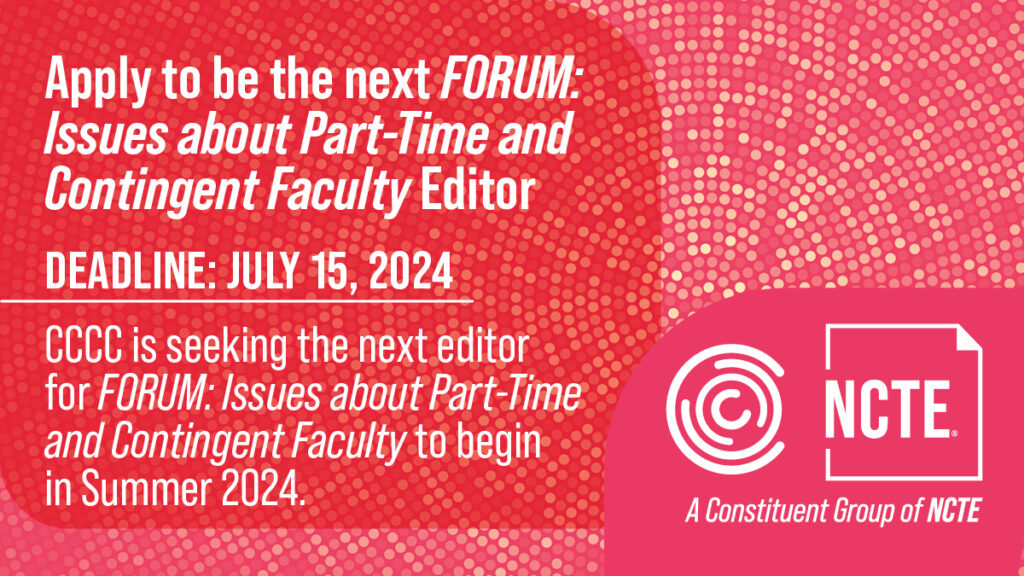Overview of the Issues
The labor resolutions at the Houston conference built on the Indianapolis Resolution, itself stemming from the landmark Wyoming Resolution passed in 1986. Each of these resolutions addresses concerns about the working conditions and path for career progression for college writing teachers.
Compensation: Though challenges with staffing and creating equitable teaching positions within college writing programs vary, a primary concern has been around compensation of instructors. In particular, contingent and/or part-time instructors in many institutions are paid significantly less than tenure-line instructors. The Committee on the Academic workforce’s portrait of contingency reports: “The median pay per course, standardized to a three-credit course, was $2,700 in fall 2010 and ranged in the aggregate from a low of $2,235 at two-year colleges to a high of $3,400 at four-year doctoral or research universities. While compensation levels varied most consistently by type of institution, part-time faculty respondents report low compensation rates per course across all institutional categories” (Coalition)1.
Position Stability: Contingent and part-time faculty positions are often held as a ‘buffer’ for enrollment fluctuations, and courses that don’t fill may be cancelled abruptly; new sections can be added; or courses assigned to cover tenure-line or full-time instructor sections that are cancelled because of low enrollment. Last-minute hiring may result in a lack of time to prepare courses, or an unacceptable number of class preparations that make quality instruction difficult.
Resource Access: As a report from the Associated Departments of English demonstrates, less than a third of non-tenure track instructors represented in the survey data could count on travel funding; less than a quarter are guaranteed funds for ongoing professional development, and just 10% could expect to find support for their own research projects.2 Other concerns are instructor access to private or shared office space, regular pay increases, and library borrowing privileges.
Autonomy: The professional authority to make independent decisions based on disciplinary expertise may be limited for non-tenure track faculty. Many NTT faculty, including graduate students, are required to teach from a standard template or syllabus, leaving very little room for independent course design and/or implementation. These requirements can lead to intellectual and pedagogical stagnation.
Representation: Access to shared governance or union representation is mixed for non-tenure track and contingent faculty, with some experiencing participation in what the Associate of Governing Boards defines as shared governance, an organizational practice that “align the faculty, board, and administration in common directions for decision-making regarding institutional direction, supported by a system of checks and balances for non-directional decisions.”3 Depending on the structure of the institution, NTT faculty may or may not have representation within a bargaining unit or institutional senate.
1 Coalition on the Academic Workforce, “A Portrait of Part-Time Faculty Members.” June 2012. http://www.academicworkforce.org/CAW_portrait_2012.pdf
2 Associated Departments of English. “Rethinking the Master’s Degree in English for a New Century.” Modern Language Association. June 2011. https://www.mla.org/content/download/25406/1164106/2011adhocrpt.pdf. Accessed 31 July 2017.
3 Bahls, Steve. “What Is Shared Governance.” Association of Governing Boards of Universities and Colleges. https://www.agb.org/blog/2015/12/22/what-is-shared-governance


 The atmosphere of the convention is far more collegial, rather than competitive, than many other preeminent national conferences. I always find CCCC conventions a productive and enjoyable opportunity to meet my peers at other institutions.
The atmosphere of the convention is far more collegial, rather than competitive, than many other preeminent national conferences. I always find CCCC conventions a productive and enjoyable opportunity to meet my peers at other institutions. Variety of sessions. Since our travel funds seem to be more and more restricted, it is vital that we can attend conferences where many different angles/approaches are covered.
Variety of sessions. Since our travel funds seem to be more and more restricted, it is vital that we can attend conferences where many different angles/approaches are covered.
